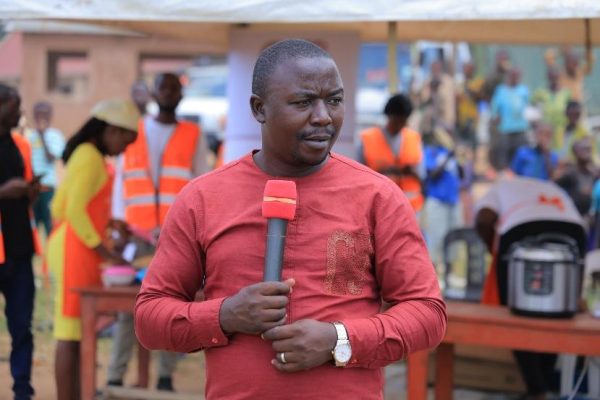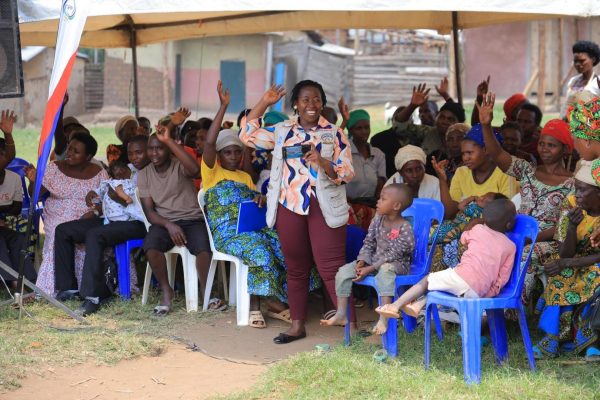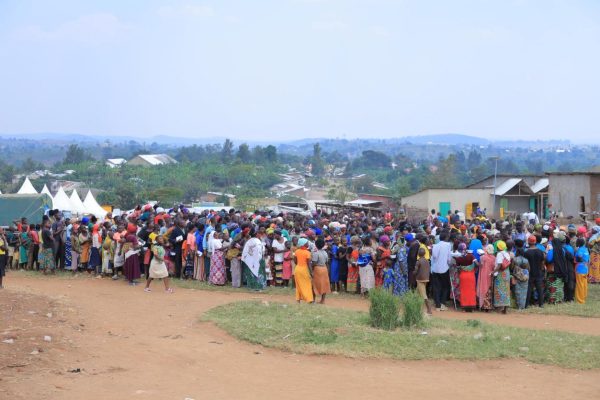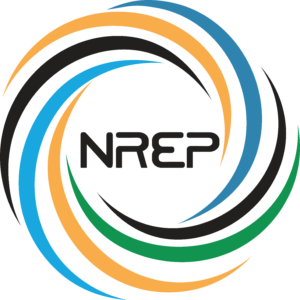On behalf of the Ministry of Energy and Mineral Development (MEMD), the National Renewable Energy Platform (NREP) is implementing the Behavioral Change Campaign for Electric Cooking (BCCeC) Project across the country. Funded by the UK government through the Modern Energy Cooking Services (MECS) Programme, the project aims to transform public perceptions and practices around clean cooking.
In accordance with The Refugees Act, 2006, which grants refugees in Uganda the same rights as citizens, including access to public services such as education, healthcare and community development initiatives, the campaign is extending its activities beyond major cities to refugee and host communities, and on 2nd September 2025, with the support of the Office of the Prime Minister, NREP carried out a community outreach in Rwamwanja Refugee Settlement in Kamwenge District. The outreach educated residents on the dangers of cooking with traditional biomass technologies and fuels, and promoted awareness of cleaner, safer and more sustainable cooking alternatives and their benefits.
A total of 496 participants attended the event at Kaihora B, demonstrating both a strong interest in learning about alternative cooking technologies and fuels, and an urgent need for solutions due to the scarcity of fuelwood for cooking within the settlement.

Key Highlights and Observations
Hands-On Cooking Demonstration
Dr. Nicholas Mukisa randomly selected participants from the audience to serve as community volunteers for the cooking demonstration. As they prepared meals using the Electric Pressure Cooker (EPC), he guided them through the safety features and basic operation of the appliance, ensuring they gained hands‑on experience with its use and its ability to prepare local dishes. A standout observation was the smokeless cooking process, which allowed participants to work comfortably and cheerfully, unlike cooking with charcoal or firewood that often leaves cooks squinting through smoke and holding back tears.
After the demonstration, participants tasted the EPC‑prepared meals and praised the cooking speed, the preservation of the food’s natural taste, and its rich flavour, noting it was comparable to dishes made over charcoal or firewood.
Exhibition of Clean Cooking Technologies
As part of the outreach, NREP held an interactive exhibition of clean cooking technologies in partnership with the Uganda National Alliance on Clean Cooking (UNACC), a membership organization comprising over 150 companies. Among the items exhibited by these companies were electric pressure cookers, improved biomass stoves, volcanic rock stoves among others.
Ms. Majorine Nakigudde from UpEnergy, one of the UNACC member companies took the participants through the basic functionality of the technologies and their pricing as well as some financing mechanisms in place to support the adoption of the technologies such as the Uganda Energy Credit and Capitalisation Company (UECCC) clean energy price subsidy program by the government of Uganda that provides subsidies between 30-50% of the initial price of the technologies.
Skit from the Rwamwanja Climate Champions
The following is a condensed account of the skit as performed at the event:
The Climate Champions performed a skit portraying a mother cooking for her family on a traditional three stone cookstove. Realizing that the firewood has ran out, she sends her children to collect more from the nearby forest. While cutting down trees, the children are stopped by a passer-by who warns them about the dangers of deforestation and the risk of exhausting the forest’s resources, to which the children respond they do not have a choice as the firewood runs out quickly in the three-stone stove.
The passer-by asks if they have heard about the improved biomass stoves promoted by SOS Children’s Village. When the children respond that they have not, she requests to meet their mother so she can explain the benefits. She tells their mother that the improved stove can make the same amount of firewood last longer instead of just a day in a 3-stone stone.
In the skit, a representative from SOS Children’s Village further explained the advantages of the stove. The mother welcomed the idea and expressed gratitude that the organization also provides firewood to adopters upon request.
The performance concluded with a call to action, as the skit team led the audience in a chorus: “Fellow Ugandans, conserve the environment, the environment of Uganda.”
By dramatizing the daily struggles of inefficient cooking, the skit resonated with the audience and effectively conveyed the organizations’ initiatives in the refugee settlement to promote sustainable cooking practices through an engaging non‑technical approach. This relatable storytelling helped demystify clean cooking technologies, making the message more memorable and increasing the likelihood of community uptake.
Voices from the Community Leadership
Mr. Amos Iraguha, Refuge Welfare Council 1 Chairperson (RWCI), welcomed participants to the event and to the Kaihora Zone. Explained that the purpose of the gathering was to demonstrate alternative cooking fuels and appliances, noting that the massive cutting down of trees for firewood had negatively affected the settlement’s climate, as evidenced by reduced rainfall. Emphasized that the knowledge to be shared during the event formed part of the solutions to help mitigate the climate challenges being experienced and urged participants to make use of the opportunity to learn.
Mr. Innocent Niyozima the Refugee Welfare Council 3 Chairperson (RWCIII), informed participants that the clean cooking demonstration by NREP was demonstrative in nature, and as such they would not only interface with the technologies but also eat. Shared with the participants that they smoke daily without knowing it, likening the process of cooking with charcoal and firewood to smoking. He explained that the smoke irritates their eyes and their lungs due to the harmful particles it contains.
Informed the participants that with modern cooking technologies, they would have eliminated the negative health impacts as well as the need to wander through swamps to collect twigs for firewood, a taxing endeavor. When he asked if some participants cook using plastic bottles, a section of them responded in the affirmative, prompting him to discourage the practice, as it is very dangerous.
Mr. Dominic Awor of SOS Children’s Villages convened partner organizations engaged in Livelihood, Environment, and Energy (LEE) initiatives in Rwamwanja Settlement, including Praise Tumushabe (Energy and Environment Officer, Nsamizi), Joy Kasiko (Education Local Enterprise Centre Uganda, ELECU), and the Resilient Achiever Foundation (RAF) to appreciate them for their efforts. Stated that September was a month of heavy rain, yet at the time of the outreach there were no signs of rain, which he used to illustrate visible climate impacts in Rwamwanja. Informed the participants that the responsibility for climate action rested with the community, supported by partners operating in the settlement, and that this was why they had invited the National Renewable Energy Platform (NREP) to equip community members with more practical knowledge on clean cooking and complement trainings already offered by SOS. He stated that immediate action was necessary, warning that any delay would jeopardize the community’s future.
Mr. Erick Tugume of Finn Church Aid (FCA) shared that the organization was implementing skilling initiatives in the settlement, stating that several children and youth were being trained to produce improved biomass cookstoves, giving them employable skills and enabling self-employment. Added that the stoves saved charcoal, thereby reducing household cooking costs. Appreciated NREP for bringing the BCCeC outreach to the settlement and noted that the technologies to be explored would meaningfully complement ongoing environmental protection and energy efficiency efforts by partners in the settlement.
Ms. Matilda Asiimwe, Senior Community Development Officer Nkoma Katalyeba Town Council, thanked MEMD and NREP for extending the BCCeC initiative to the refugee settlement. Emphasized that the impacts of dirty cooking disproportionately affect women, making clean cooking a lifeline for all women in the settlement. Adding her voice to the calls from the RWCIII Chairperson and the Commandant, she advocated subsidies and installment payment options for clean cooking appliances to benefit both host and refugee communities. Ms. Asiimwe also urged participants to dispel the misconception that meals prepared with electricity are less tasty. She further requested NREP to extend outreach to other zones within the settlement and host community that were unable to attend the event, so they too could benefit from the clean cooking message.
Ms. Sarah Achen, Assistant Commandant for Livelihood, Energy and Environment in the Office of the Prime Minister, expressed appreciation to SOS and Finn Church Aid for partnering with NREP to bring the BCCeC initiative to Rwamwanja. Noted that SOS and FCA have a deep understanding of the community’s challenges, and for that reason the Office of the Prime Minister would work closely with them and NREP to make clean cooking technologies more affordable for residents, helping to save not only their time but also their lives. Ms. Achen reaffirmed the OPM’s commitment to supporting clean cooking initiatives within the settlements. She also thanked all attendees, in their various capacities, for making time to participate in the campaign workshop.
Mr. Julian Ahiira, District Forestry Officer for Kamwenge District, delivered the closing remarks for the event. Reaffirmed that district local government leadership and its partners are committed to environmental restoration, noting that one way to achieve this is by promoting sustainable cooking practices. Urged participants to put into practice the knowledge gained during the outreach workshop and to adopt the technologies currently within their reach, such as improved biomass cookstoves and briquettes.
Requested MEMD, NREP and SOS to promote clean cooking technologies that local communities can afford, and to provide training that would enable residents to produce their own cooking fuels, such as briquettes, and fabricate their own cookstoves. He officially closed the gathering.
Key Challenges & Recommendations
The high upfront cost emerged as the most significant barrier to adopting clean cooking technologies. When prices were shared during the event, murmurs of disbelief and audible expressions of surprise underscored the affordability gap. In response, the RWCIII Chairperson, speaking on behalf of residents, called for subsidies tailored to the refugee context to make adoption feasible. Dr. Nicholas Mukisa advised the leadership to submit a formal written request, which NREP could then escalate to the Ministry of Energy, the UK government, and other partners for consideration.
The assistant commandant of the refugee settlement noted that some beneficiaries of clean energy training, particularly in briquette production, were not achieving the required quality standards. As a result, the briquettes produced were not being used. Dr. Nicholas Mukisa emphasized that quality is essential for adoption and assured participants that NREP would collaborate with organizations such as Nsamizi to address the issue. This support would include linking producers with the Uganda National Bureau of Standards (UNBS) and UNACC to improve production processes.
A shortage of firewood was also reported, with some participants resorting to using plastic bottles as cooking fuel, a practice with serious health and environmental risks.
For participants without grid access, Dr. Mukisa presented alternative options such as solar powered electric pressure cookers, improved biomass stoves, solar aided volcanic rock stoves, and briquette stoves, encouraging them to adopt solutions suited to their current circumstances.

Conclusion & Next Steps
Conclusion
The BCCeC outreach in Kaihora B, Rwamwanja Refugee Settlement successfully brought together residents, community leaders and stakeholders from among the organizations operating within the settlement to engage in practical demonstrations, open dialogue and shared learning on clean cooking solutions. Through the skits, hands-on-sessions, stakeholder remarks, and active participation from the community, both the opportunities and barriers to adoption were highlighted, and existing solutions presented while unique ones were documented for deliberation and action.
The active participation of community members, coupled with the commitment expressed by government representatives, NGOs and the local leadership, underscored a shared recognition that clean cooking wasn’t just an energy imperative but also an environmental, health and livelihood priority.
Next Steps
On receipt of formal requests from the settlement leadership, NREP will escalate the requests to MEMD and other relevant partners for action.
NREP will collaborate with Nsamizi, UNBS and UNACC to provide training for briquette producers within the settlement on how to produce quality briquettes, as well as explore opportunities to have the products certified.
NREP will leverage the close working relationship with the OPM to utilize community champions and partnerships with organizations operating in the refugee settlement to extend clean cooking awareness to zones within the settlement that couldn’t attend the initial engagement.




